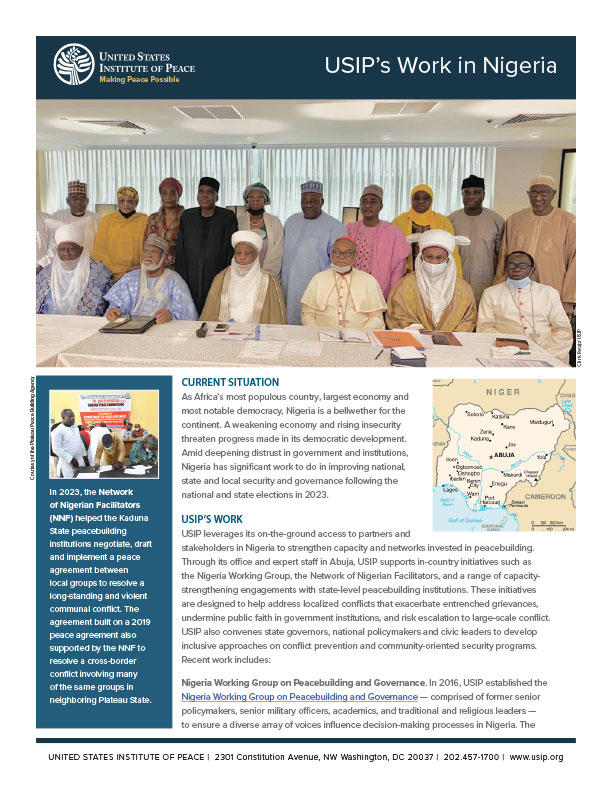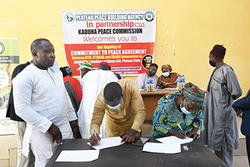A USIP Fact Sheet
As Africa’s most populous country, largest economy and most notable democracy, Nigeria is a bellwether for the continent. A weakening economy and rising insecurity threaten progress made in its democratic development. Amid deepening distrust in government and institutions, Nigeria has significant work to do in improving national, state and local security and governance following the national and state elections in 2023.
USIP's Work
USIP leverages its on-the-ground access to partners and stakeholders in Nigeria to strengthen capacity and networks invested in peacebuilding. Through its office and expert staff in Abuja, USIP supports in-country initiatives such as the Nigeria Working Group, the Network of Nigerian Facilitators, and a range of capacity-strengthening engagements with state-level peacebuilding institutions. These initiatives are designed to help address localized conflicts that exacerbate entrenched grievances, undermine public faith in government institutions, and risk escalation to large-scale conflict. USIP also convenes state governors, national policymakers and civic leaders to develop inclusive approaches on conflict prevention and community-oriented security programs. Recent work includes:
Nigeria Working Group on Peacebuilding and Governance
In 2016, USIP established the Nigeria Working Group on Peacebuilding and Governance — comprised of former senior policymakers, senior military officers, academics, and traditional and religious leaders — to ensure a diverse array of voices influence decision-making processes in Nigeria. The working group fosters relationships between citizens, policymakers, and national and international figures to turn localized expert analysis into tangible, actionable policy options that are presented at Nigerian decision makers’ request.
Ahead of the 2023 elections, the working group organized a six-episode television program highlighting citizens’ perspectives on key issues in the election that aired over 30 million viewers throughout Nigeria. The working group is regularly invited by state and national policymakers to provide recommendations on a range of issues, from inclusive governance, regional dynamics and electoral violence to communal conflicts between pastoralists and farming communities.
Network of Nigerian Facilitators (NNF)
The NNF is a group of professional peace mediators trained by USIP to resolve local conflicts through nonviolent means across 11 states. NNF dialogues focus on strengthening community-security relationships and mitigating intercommunal, pastoralist-farmer and election-related violence. Since 2019, the NNF has collaborated with state peacebuilding institutions to address conflicts and support local peace processes.
Strengthening State Governments and Peacebuilding Institutions
Nigeria’s federal system bestows governors with the responsibility of addressing the issues driving the country’s multiple conflicts, including intercommunal violence, deepening regional divides, armed banditry and terrorism. USIP supports governors and state peacebuilding institutions in establishing inclusive, cooperative strategies to prevent and resolve violent conflicts and aligning policies with citizens’ needs surrounding governance and human security.
Resilient and Responsive Local Security Approaches
Through USIP’s ongoing Justice and Security Dialogue project, citizens at the local level work together to identify security challenges specific to their communities. With USIP’s support, community members organize dialogues that bring together internally displaced communities and local police to develop practical and concrete solutions that build trust, foster accountability and preserve local agency.
Providing Security Policy Options to Nigerian Policymakers
USIP conducts research on governance and security to inform Nigerian policymakers’ responses to growing challenges in a complex regional environment. USIP has published research mapping state peacebuilding institutions; assessing election-related violence risks; and outlining pathways to civilian-led governance amid the Boko Haram insurgency in northeast Nigeria.
Convening U.S. and Nigerian Senior Policymakers
USIP fosters stronger ties and collaboration between U.S. and Nigeran senior policymakers by convening government officials, partners and civic leaders at its Washington headquarters and its Nigeria country office for candid and productive conversations that inform USIP’s program priorities. USIP hosted then-President Muhammadu Buhari in 2022, the Buhari-Tinubu presidential transition team in 2023, and President Tinubu’s national security advisor Nuhu Ribadu in 2024. In 2024, USIP will convene governors from Katsina, Zamfara, Kaduna, Niger, Sokoto, Kebbi, Benue and Plateau states for another high-level symposium in Washington that allows U.S. stakeholders to work directly with “front-line” governors to develop inclusive strategies for addressing the drivers of conflict and insecurity in northern Nigeria.
Expanding the Institute’s Field Work
In 2020, USIP established a country office in Abuja to deepen its operations with credible partners and stakeholders based in the region and sustain its direct action for peace in Nigeria.
In 2023, the Network of Nigerian Facilitators (NNF) helped the Kaduna State peacebuilding institutions negotiate, draft and implement a peace agreement between local groups to resolve a long-standing and violent communal conflict. The agreement built on a 2019 peace agreement also supported by the NNF to resolve a cross-border conflict involving many of the same groups in neighboring Plateau State.

